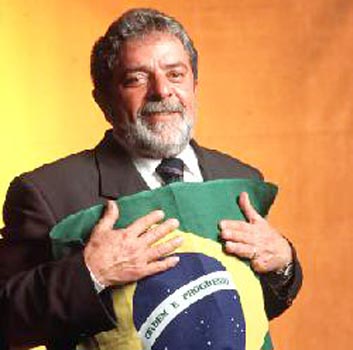Lula takes anti-protectionism crusade to G20 summit
 Buenos Aires - Brazilian President Luiz Inacio Lula da Silva has long made it clear that he does not like going to international summits as anything other than a protagonist - and he is travelling to London for the G20 summit in April with very clear views.
Buenos Aires - Brazilian President Luiz Inacio Lula da Silva has long made it clear that he does not like going to international summits as anything other than a protagonist - and he is travelling to London for the G20 summit in April with very clear views.
Protectionism is not a way out of the ongoing global economic and financial crisis, he is bound to say, and it is industrialized nations which caused the crisis in the first place and therefore should bear the brunt of the cost by helping poorer countries recover from the effects.
Lula is likely to say this, of course, because he has been pounding in that message for months.
"(This is) an economic crisis born at the heart of rich countries, and those rich countries have responsibilities to try and find a way out. It is affecting us all, and Europe and the United States have a greater responsibility," he said during a visit to US President Barack Obama in Washington in March.
"This is a crisis which did not arise in emerging countries or in the periphery of the system. It was born at the heart of the developed world, caused to a large extent by the lack of control of the financial system in the richest countries," he told business leaders in New York.
Banks forgot about reality and their sector became a "large casino" where anything went, Lula has said.
"Within a short time, the ambition of some gave way to the panic of many," he noted.
The former trade-union leader Lula - who has a leftist power base at home - sometimes even appears to derive satisfaction from the crisis.
"The Market-God went bankrupt due to lack of responsibility. Wall Street yuppies were busy calculating our countries' risks and are now asking governments for support," he said in January, flanked by controversial Venezuelan President Hugo Chavez at a social event.
The Brazilian leader is lucid and graphic when he speaks. And with his new but undisputed status as a global leader, he is most likely to attempt to tell the heads of the world's largest economies - gathered in London alongside their developing-country partners - where they should be looking for solutions to the current crisis, and where they should not go.
"The solution to this crisis is more market activity, more free trade, more competition," he has stressed.
"We cannot go from the 'everything goes' in finance that led the planet to the current situation to an 'everything goes' in protectionism which will surely lead it to a crisis worse than the one that resulted in the Second World War," he said.
Although market analysts are less optimistic, Lula insists that Brazil, the world's 10th-largest economy, is in good shape to get through the slump without excessive damage, even if probably not unscathed.
The South American giant's GDP grew by 5.1 per cent last year, below the 5.7 per cent of 2007 but above the 4.6 per cent of 2006. For 2009, Brazilian authorities expect an expansion of 2-2.5 per cent, although markets put their estimate at barely 0.6 per cent growth.
"Brazil did not go bankrupt, and it will not go bankrupt. While most rich countries slip into recession, Brazil will keep growing. Less than we would like it to, but it will keep growing," Lula said.
The president and his government stress that their policies of recent years, which have lifted millions of Brazilians out of poverty through special develpment measures, have boosted internal demand in such a way that the country can stand a severe slump in global markets.
Lula's ambitious Growth Acceleration Programme (PAC), launched before the world economy collapsed and which contemplates investment in infrastructure worth some 250 billion dollars, will also help, his government says.
Unlike in earlier crises, Brazil no longer has a severe debt problem and indeed has 200 billion dollars in reserves of foreign currency, an amount that is higher than the country's foreign debt.
Still, they are not happy with the way the industrialized world is going about solving everybody's problem.
"Are rich countries only going to keep putting money into saving the banks, or are any of them going to have the courage to - without fearing the word - nationalize banks, recover them and get back credit?" Lula said recently.
As he presents himself as the leader of a more-or-less healthy economy, one of the few left in the world, Lula will probably seek in London a more central role for Brazil in the world's leading political and financial organs, through reform of the UN Security Council and the International Monetary Fund (IMF) to incorporate a broader basis.
"I leave with the certainty that the political geography of the world has been given a new dimension," a satisfied Lula said as he left the first G20 summit in November.
In London, he will seek to make good on that certainty. (dpa)